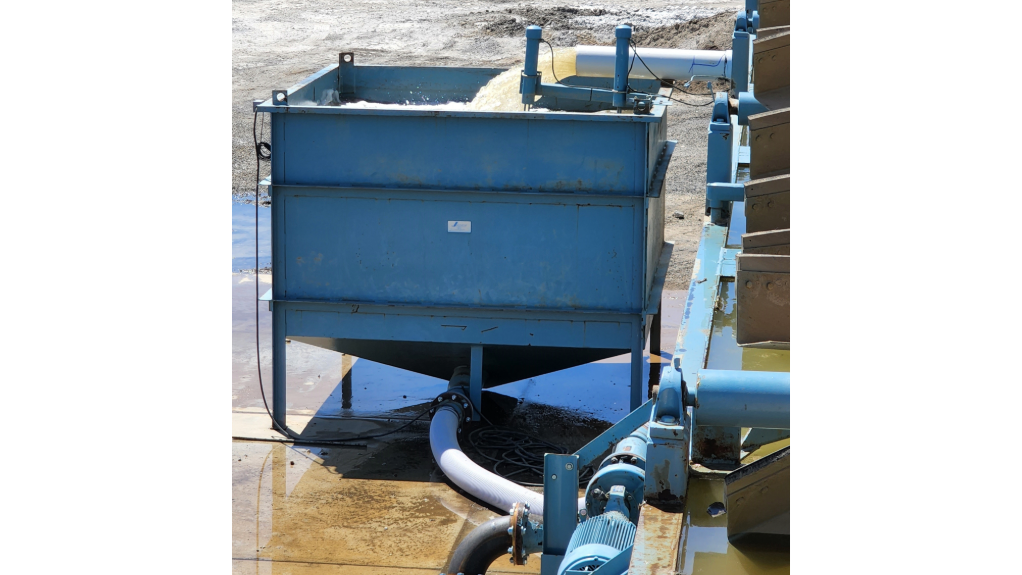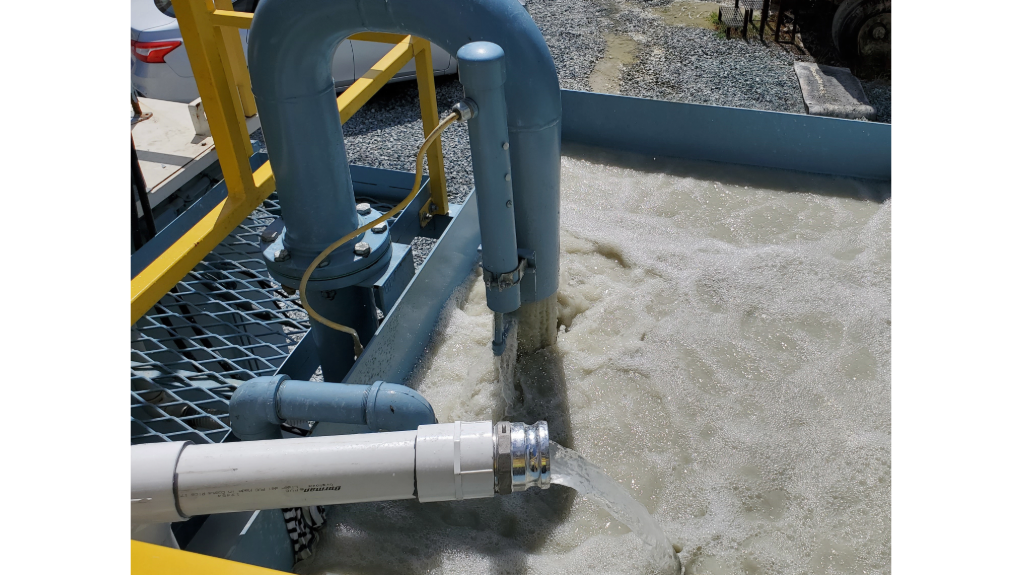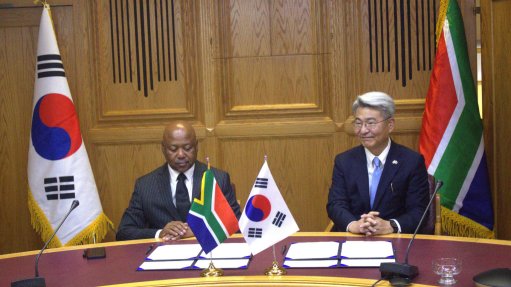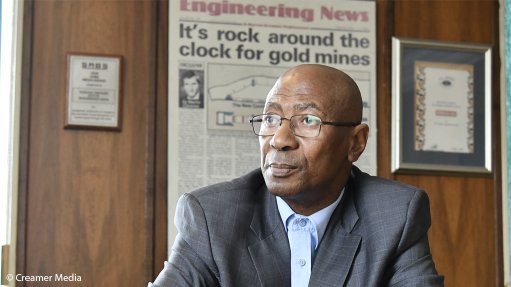Water clarification technology eliminates settling ponds



SETTLER/CLARIFIER SYSTEM Clarified water from a Jadair Settler/Clarifier System
RESOLVING WATER ISSUES The Jadair Settler/Clarifier System can resolve issues such as water loss in settling ponds
Advanced water clarification technology solutions on offer from water recycling and concrete reclaiming systems developer Jadair International – such as its Settler/Clarifier System – are enabling mining operations to resolve issues such as water loss in settling ponds, in turn, reducing the need for water replacement and lowering the requirement for clean-ups and maintenance.
For mines and quarries that process dimensional stone, gold, crushed rock, sand or aggregate, washing these materials is a crucial step in supplying clean, high-quality products.
Washing, a common practice in these operations, removes impurities such as clay, silt and organic matter. The dirty wash water is then processed to separate the solids from the water, following which the water can be reused.
Jadair International claims that its technology has the potential to make settling ponds obsolete by effectively and economically providing a continuous supply of clarified water, as well as thick, easy-to-handle solids, with a lower maintenance and labour requirement.
“Modern clarifiers can separate water and solids at a high rate, in a closed-loop, automated process. The process is even more efficient when using properly specified and prepared polymers. The combined result is continuously clean water and manageable solids,” says Jadair International Port Washington president Shane Schmutzler.
Traditional Limitations
Settling ponds, widely used to collect the wastewater from washing mined materials, allow suspended solids and fine sediments to settle to the bottom over time. The clarified water is then either recycled for reuse in the wash process or discharged, depending on local regulations.
However, settling ponds have serious limitations, reports Jadair International, as they can sometimes run out of clean water, interrupting the plant’s washing process.
Settling ponds can also require substantial ongoing maintenance, including the requirement for cleaning and liner repairs.
To clean accumulated material from a settling pond, mine operators can use draglines, excavators and haul trucks, but Jadair International says this process is tedious and costly, as excavating wet “soupy” sludge is slow and makes a mess of the area and the equipment used.
In addition, equipment operator time is expensive, and the wear-and-tear on equipment can be significant.
Severe weather can also cause substantial damage to ponds and require additional clean-up work to be performed.
Ponds also require large amounts of make-up water when water evaporates or seeps into the ground, with the cost to replace make-up water, which is often purchased from a local utility or pumped from wells, adding up quickly.
Real estate is another consideration for a traditional settling pond, as such infrastructure can account for a significant amount of space that could otherwise be put to better use, or sold off.
Modern Water Clarification
Jadair International’s Settler/Clarifier System – a specialised, non-toxic, polymer-based chemical – is injected into a water stream before it enters a machine.
The polymer promotes flocculation, a process which causes small particles to clump together into larger particles called flocs, which settle to the bottom, leaving clarified water above it, following which the clarified water is discharged into a receiving tank for reuse.
The solids are removed from the machine after accumulating in the front of the Settler/Clarifier System.
The Settler/Clarifier System separates the suspended solids and discharges them in a thickened form that does not require secondary processing, a process following which the solids can be easily moved by a loader or belt conveyor.
“Discharged solids can be easily scooped up by loaders and stacked for further drying or sale to companies such as those involved with landscaping, landfill or soil remineralisation. What was once a waste product can become a saleable product,” enthuses Schmutzler.
The closed loop Settler/Clarifier System can recycle thousands of litres of water a minute.
Once established, the Settler/Clarifier System requires little operator supervision, claims Jadair International.
“The process is essentially automated, which allows for minimal operator interaction. This allows the customer to do their job while the machine does its job. The system also requires very little maintenance and, there is no pond sludge to deal with,” says Schmutzler.
To determine the best polymer for each application, Jadair International provides water testing and evaluation services to help ensure optimum water clarification and system performance. The company works directly with multiple polymer manufacturers to find the best product for each plant’s application.
“Selecting the correct polymer, ensuring its proper preparation and optimising its reaction, all make a significant difference in its effectiveness. This meticulous approach can help plants use less polymer, achieve superior liquid/solids separation, and get cleaner, higher quality water,” says Schmutzler, adding that customers have reported up to a 50% reduction in the amount of polymer used over previous levels.
Article Enquiry
Email Article
Save Article
Feedback
To advertise email advertising@creamermedia.co.za or click here
Comments
Press Office
Announcements
What's On
Subscribe to improve your user experience...
Option 1 (equivalent of R125 a month):
Receive a weekly copy of Creamer Media's Engineering News & Mining Weekly magazine
(print copy for those in South Africa and e-magazine for those outside of South Africa)
Receive daily email newsletters
Access to full search results
Access archive of magazine back copies
Access to Projects in Progress
Access to ONE Research Report of your choice in PDF format
Option 2 (equivalent of R375 a month):
All benefits from Option 1
PLUS
Access to Creamer Media's Research Channel Africa for ALL Research Reports, in PDF format, on various industrial and mining sectors
including Electricity; Water; Energy Transition; Hydrogen; Roads, Rail and Ports; Coal; Gold; Platinum; Battery Metals; etc.
Already a subscriber?
Forgotten your password?
Receive weekly copy of Creamer Media's Engineering News & Mining Weekly magazine (print copy for those in South Africa and e-magazine for those outside of South Africa)
➕
Recieve daily email newsletters
➕
Access to full search results
➕
Access archive of magazine back copies
➕
Access to Projects in Progress
➕
Access to ONE Research Report of your choice in PDF format
RESEARCH CHANNEL AFRICA
R4500 (equivalent of R375 a month)
SUBSCRIBEAll benefits from Option 1
➕
Access to Creamer Media's Research Channel Africa for ALL Research Reports on various industrial and mining sectors, in PDF format, including on:
Electricity
➕
Water
➕
Energy Transition
➕
Hydrogen
➕
Roads, Rail and Ports
➕
Coal
➕
Gold
➕
Platinum
➕
Battery Metals
➕
etc.
Receive all benefits from Option 1 or Option 2 delivered to numerous people at your company
➕
Multiple User names and Passwords for simultaneous log-ins
➕
Intranet integration access to all in your organisation




















